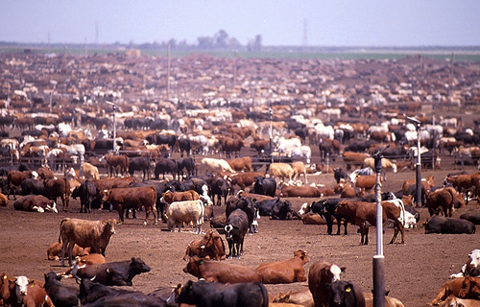 For hundreds if not thousands of years, rabbis have combated the notion that kosher equals healthier. We've all heard the argument that the Torah forbade pork because of trichinosis - just search "trichinosis kosher" on Google and you'll find a number of powerful refutations to the idea.
For hundreds if not thousands of years, rabbis have combated the notion that kosher equals healthier. We've all heard the argument that the Torah forbade pork because of trichinosis - just search "trichinosis kosher" on Google and you'll find a number of powerful refutations to the idea.We don't keep kosher because it's better for our bodies; we do so because God commanded us to refrain from eating certain types of foods. Keeping kosher is a mitzvah - a commandment, irrespective of the health benefits (or detriments).
As an aside, I was once treated by a non-Orthodox rabbi who claimed that Orthodox Jews lead less healthy lives, and we're always eating. He has a point: Friday night - big meal. Shabbat morning - kiddush, then run home for another big meal. And then Seudah Shlishit. (Hey, it's a mitzvah). Not to mention pizza on Motzei Shabbat - for Melave Malka of course.
Yet, the stereotype of kosher being "healthier" remains.
The New York Times recently ran a piece titled, "For Some, ‘Kosher’ Equals Pure" describing the recent volcanic growth in the American Kosher food market.
Only about 15 percent of people who buy kosher do it for religious reasons, according to Mintel, a research group that last year produced a report on the kosher food explosion. The top reasons cited for buying kosher? Quality, followed by general healthfulness.It's a safe bet that that's not true. After all, as the article states, an Oreo's an Oreo, no matter whether the OU supervised its production or not. And eating it is not a healthy endeavor.
But there might be one area where keeping kosher does increase the odds of eating healthy, and that's specifically in the area of meat.
 I recently watched Food Inc., a movie intended to shock, upset and alarm the American consumer about the explosion of Agribusiness, the feed lots, the increase of corn in food, and many other sad realities of modern agricultural business. Not much of it surprised me. But it was clear that animals raised in huge feed lots, eating tons of antibiotic-laced corn feed must be far less healthy than grass fed animals. In some way, the inspection process for kashrut must help weed out the unhealthiest of those animals from the kosher meat chain.
I recently watched Food Inc., a movie intended to shock, upset and alarm the American consumer about the explosion of Agribusiness, the feed lots, the increase of corn in food, and many other sad realities of modern agricultural business. Not much of it surprised me. But it was clear that animals raised in huge feed lots, eating tons of antibiotic-laced corn feed must be far less healthy than grass fed animals. In some way, the inspection process for kashrut must help weed out the unhealthiest of those animals from the kosher meat chain.If you've ever been in an American slaughterhouse, you know that immediately following slaughter an animal undergoes a USDA inspection, as well it should. But that same animal undergoes a far more rigorous kashrut inspection, specifically with regard to the lesions on the lungs. It's not uncommon (from what I recall) for a kosher plant to have a 25 percent rejection rate. Anyone want to guess what happens to those twenty-five percent? That's right: they're sold right back into non-kosher production. After all, those animals were already USDA approved.
So, if you're Jewish, keep kosher because God told you to. But, in the age of processed meat and modern production methods, eating kosher might just be more healthy as well.

No comments:
Post a Comment
Comments transform a blog into a community. Please join.